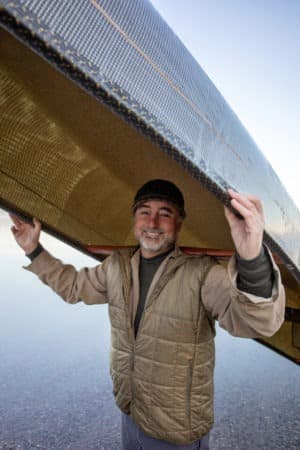Stronger Than You Think
A long-time resident of Oro-Medonte, Drew Hodgins is quiet and reserved. He’s someone who is thoughtful with his words and contemplates his actions before making them. He’s not one for loud celebration or anything that will put him at the centre of attention.
So, when he arrived for his first radiation appointment at RVH’s David and Catherine Hudson Regional Cancer Centre in July 2021, he was certain he wouldn’t be one of those banging the gong at the end of his treatment.
In March of 2021, Drew was experiencing some discomfort. He went to the after-hours clinic and the attending physician prescribed him an antibiotic to help him feel better. When that didn’t resolve the problem, Drew went to his family doctor to follow up. He, too, gave Drew an antibiotic and ordered some bloodwork to see if there was anything else going on. As an afterthought, he tacked on an additional test.
Drew had his blood drawn at his local Life Labs location. The next day, he looked online at his results. The PSA test that his doctor ordered was showing a result far outside the indicated normal range. A PSA test measures the amount of prostate-specific antigen in the blood.

A short while later, his doctor called.
“He rhymed off a number of things it could mean,” said Drew. But, it was only the last option that he heard. “He immediately referred me to an urologist who sent me for additional testing.”
Over the next two weeks, Drew underwent a series of diagnostic tests – ultrasounds, a CT scan, a bone scan and a biopsy.
He and his wife Leigh let their grown children know what was going on.
“We told the kids what we knew, but we tried not to be alarmist. Of course, they worried.”
Out of the ten samples biopsied, nine came back positive for cancer.
In the meantime, a conversation with his brother set Drew on a fact-finding mission. He did not grow up knowing much about his father. And as an adult, did not have a relationship with him. His brother had done some digging and found out their dad also had prostate cancer and took part in a clinical study at Princess Margaret Hospital in Toronto. He implored Drew to find out more to see where that could lead.
“I called up Princess Margaret and explained my situation. After a few conversations, I was put in touch with an urologist. He reviewed my file and determined that I met the criteria for a clinical registry using experimental scanning technology.”
The main focus of the registry involved using a PET (positron emission tomography) scan in combination with a radioactive substance called a tracer. These tracers seek out prostate-specific membrane antigens and make them highly visible when scanned.
Drew met with his urologist to discuss the outcome of the scan.
“I was dumbfounded,” recalled Drew. “My wife, Leigh, picked me up from my appointment and I was just silent. We drove quite a while before I could even speak. That was one of the most difficult days of my life.”
The scan showed three additional tumours outside of the prostate, meaning Drew’s cancer had spread.
“I worked at Honda for 30 years. We had access to a physician and were given an annual physical. I’m healthy. I teach skiing. I golf twice a week. I don’t eat sugar. I had no symptoms. I just could not believe it.”
“The ability to receive radiation treatments at RVH was so important for my emotional wellbeing. I was able to travel 15 minutes down a country road, from where I live to the hospital, to receive my treatments.”
Drew Hodgins
Drew’s treatment plan included radiation therapy at the Hudson Regional Cancer Centre at RVH – a 15-minute drive away from home.
“The ability to receive radiation treatments at RVH was so important for my emotional wellbeing,” said Drew. “I was able to travel 15 minutes down a country road, from where I live to the hospital, to receive my treatments. I can only imagine how commuting to downtown Toronto for treatment, every day for 35 days, would have been a huge hit to my mental health.”
Drew underwent radiation Monday to Friday for five weeks. When the radiation sickness inevitably took its toll, he was even more grateful to be close to home.
On his last day of treatment, he gave the gong a light tap on his way out.
He is now on hormone therapy to manage his cancer and receives injections every three months.
Like so many people living with cancer, Drew’s journey has been an exercise in mental strength as much as it has been physical.
“For a long time, I was just going through the motions,” he said. “I hadn’t accepted what was happening. I was feeling really sorry for myself. I wasn’t a nice person to be around.”
Then something clicked. He decided to share his diagnosis publicly and start living his life again.
“It’s on my mind all the time,” he says of the disease. “It creeps into every thought. It’s hard to separate the thought of the cancer from anything else. I’m working on it. I’m learning to live with my diagnosis.”
In July 2023, Drew lost his battle with cancer, but to say he went quietly into the good night would be a disservice to the grit and grace he demonstrated until the very end. Drew will be remembered as a man who loved to ski, canoe, and golf, but above all else, as a devoted husband, father, and friend.
Drew’s motto for life was “Stronger than you think” – a phrase he recently had tattooed on his forearm to remind himself of the way he wanted to live every day.
If you know Drew, or can relate to his story, please honour his legacy by making a donation. Your contribution will help more people live their wild lives, like Drew was able to.

